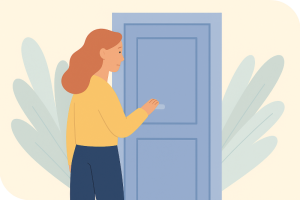Visiting a loved one’s home can be a challenging experience, filled with a mix of emotions.
When visiting a loved one’s home, it’s essential to take care of yourself during this emotional time.
This guide will help you navigate the feelings that arise when visiting a loved one’s home after they pass away.
💔 Why Visiting a Loved One’s Home Can Feel Difficult
Walking into your loved one’s space can bring a wave of emotions. You may see reminders of daily life suddenly paused — a cup on the counter, an open book, or familiar smells.
💡 Remember: visiting a loved one’s home is a significant step in the grieving process. Take it at your own pace, and bring someone with you if possible.
✅ First Practical Steps When You Visit
On your first visit, you don’t need to sort everything out. Just focus on a few urgent checks:
- Secure the property
- Lock doors and windows.
- If needed, change locks (especially if keys were widely shared).
- Check pets, plants, and perishables
- Arrange care for any animals.
- Remove perishable food from fridges and bins.
- Turn off utilities (if empty long-term)
- Switch off ovens, hobs, and electrical appliances.
- Lower heating (but don’t turn off completely in winter to avoid frozen pipes).
- Collect important documents
- Look for the will, birth/marriage certificates, bank papers, insurance policies.
- Place them somewhere safe for later.
- Forward urgent post
- Collect mail to avoid missed bills. You can arrange Royal Mail redirection later.
🛡️ Safety and Insurance
- Notify insurers: Many home insurance policies require you to inform them if a property is empty.
- Check car insurance: If a car is at the property, confirm cover before using or moving it.
- Utilities: Take meter readings — you’ll need them for estate accounts.
🧹 When (and When Not) to Start Sorting Belongings
It’s natural to feel pressure to “clear the house.” But unless there are urgent reasons (like tenancy deadlines), this doesn’t need to be rushed.
- Take your time: Grief makes sorting possessions emotional.
- Wait for probate: Some assets can’t be legally distributed until probate is granted.
- Start small: If you need to, begin with personal items you want to safeguard (photos, jewellery, important papers).
🧭 Emotional Care While Visiting
- Bring a family member or friend for support.
- Allow yourself to step outside if it feels overwhelming.
- Don’t feel pressured to “be productive” — just securing the property is enough at first.
- Consider rituals: lighting a candle, saying a few words, or simply sitting quietly.
🤝 Getting Help
If visiting feels too much:
- Ask a trusted friend to go in with you.
- Professional house clearance services can help when the time is right.
- Charities may accept donations of clothes, books, or furniture.
📌 Key Takeaways
- It is crucial to approach the task of visiting a loved one’s home with care and patience.
- Visiting a loved one’s home after they die is emotional — take it slowly.
- First priority: security, pets, perishables, documents, and insurance.
- Don’t rush clearing belongings unless necessary.
- Consider seeking support while visiting a loved one’s home to manage emotions.
